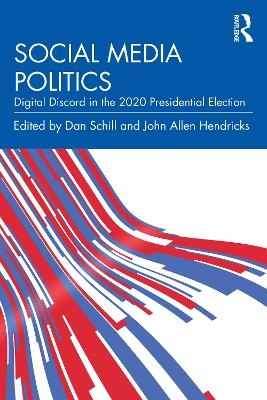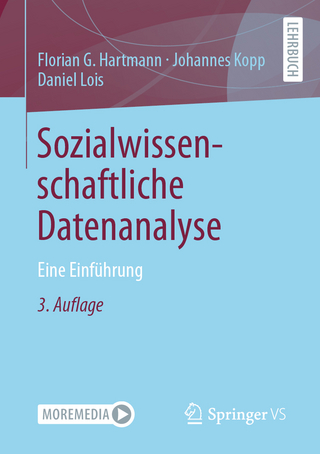
Social Media Politics
Routledge (Verlag)
978-1-032-52961-5 (ISBN)
Social media and social networking services are integrated into the American political process and have profoundly influenced political communication and participation. Social media platforms have transformed the political landscape by revolutionizing information dissemination, citizen engagement, and public opinion formation and change. Politicians use social media to communicate directly with voters in an unmediated and unfiltered manner. Comparatively, voters use social media to follow the latest messaging from politicians accompanied by demonstrating their support for particular politicians.
This book is a comprehensive examination of the role of digital and social media in the 2020 U.S. presidential election. Political discourse during the 2020 election revealed political disharmony and a deep political division among vast swaths of Americans that was powered, in part, by social media. This book reveals how digital and social media have reshaped power dynamics by altering the relationships among citizens, politicians, and traditional media outlets, the emergence of new influencers, and the impact of online activism on policy agendas.
This book, Social Media Politics, includes scholars with varied backgrounds and experience, using both quantitative and qualitative methodologies, from leading research institutions around the nation. Students, scholars, and practitioners will gain new knowledge to more clearly understand the role social media played in the 2020 presidential campaign.
Dan Schill is Professor in the School of Communication Studies and Affiliate Professor in Political Science at James Madison University, where he teaches courses in advocacy, political communication, research methods, and media and politics. His research focuses on communication, politics, media, and technology. John Allen Hendricks is Chair of the Department of Mass Communication and Professor at Stephen F. Austin State University, a member of the University of Texas System, where he teaches courses in communication theory, research methods, First Amendment law, and media and politics. He has authored/edited more than 12 books and has received book awards from the National Communication Association (NCA) and the Broadcast Education Association (BEA).
Part 1: Social media and Political Disharmony 1. Social Media Bonding and Bridging in the Political Polarization of the 2020 Presidential Election Hyun Jung Yun 2. Incivility in 2020 Presidential Candidate Social Media Posts and Posts That Cite Them Kate Kenski, Steve Rains, Yotam Shmargad, Kevin Coe and Steve Bethard 3. Emotional Contagion as the New Propaganda? Fear and Anger Framing Effects in Facebook Political Advertising on Engagement Abby Hendricks Salopek, Kristen Sussman, and Pooja Iyer 4. Presidential Tweets in The News: How Did the Partisan News Media Report on the Candidates’ Tweets during the US 2020 Presidential Election Campaign? Monica Ancu, Miyoung Chong, and Stephen Song Part 2: Social Media and Partisan Division 5. How Social Media Shaped Political Expression, Partisan Identity, and Trumpism Resistance Efforts During the 2020 U.S. Presidential Election Pamela A. Labbe 6. Voters-Turned-Political Influencers: Social Media Users Maintain Popularity by Cultivating Support for 2020 US Presidential Election Candidates Katelyn Brooks and Mariah Wellman 7. Platform Guardrails: Social Media Accountability and Political Communication Joshua M. Scacco, Andrew Anderson, and Mitchell Popovic 8. The ‘Big Lie’ Lurked Online: Social Media and Perceptions of Electoral Integrity Prior to Election 2020 Sharon E. Jarvis and Dakota Park-Ozee 9. Information Warfare Fostering Political Polarization: Facebook Addiction, News Credibility, and Concern of Foreign Interference Danielle R. Mehlman-Brightwell and Mark J. Piwinsky Part 3: Social Media and Political Discourse 10. The Politically Engaged: Gen Z’s Use of Social Media During The 2020 Presidential Elections Nune Grigoryan 11. Advancing Populist Rhetoric through the ‘Migrant Caravan’ Frame Daniela V. Dimitrova and Beau Coberley 12. Late-Night Political Humor and the 2020 Presidential Campaign: Still All Trump, All the Time By Stephen J. Farnsworth, S. Robert Lichter, and Farah Latif 13. Blame the Cobwebs or the Spiders? The Impact of Social Media use on Political Knowledge, Talk, and Participation Alec Tefertiller and Raluca Cozma 14. Narrating the Pandemic: Compounding Crisis, Politics & Presidential Responses Connections Between Communication Ecology and Collective Memory Daryl A. Carter and Mildred F. “Mimi” Perreault
| Erscheinungsdatum | 13.03.2024 |
|---|---|
| Zusatzinfo | 36 Tables, black and white; 20 Halftones, black and white; 20 Illustrations, black and white |
| Verlagsort | London |
| Sprache | englisch |
| Maße | 152 x 229 mm |
| Gewicht | 1420 g |
| Themenwelt | Geisteswissenschaften ► Philosophie |
| Sozialwissenschaften ► Kommunikation / Medien ► Medienwissenschaft | |
| Sozialwissenschaften ► Politik / Verwaltung | |
| ISBN-10 | 1-032-52961-X / 103252961X |
| ISBN-13 | 978-1-032-52961-5 / 9781032529615 |
| Zustand | Neuware |
| Informationen gemäß Produktsicherheitsverordnung (GPSR) | |
| Haben Sie eine Frage zum Produkt? |
aus dem Bereich


